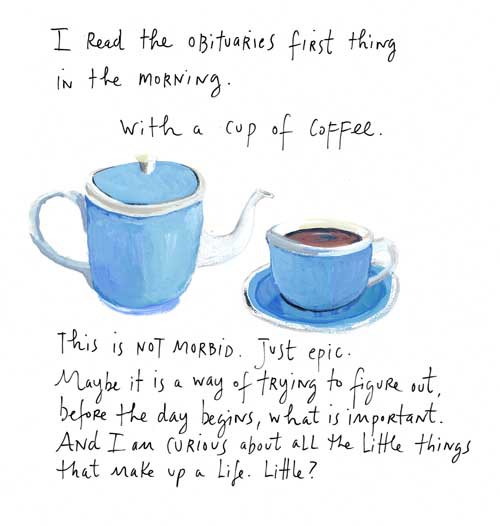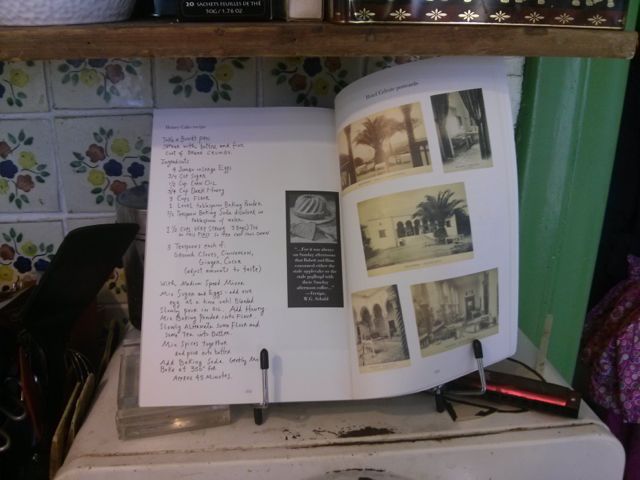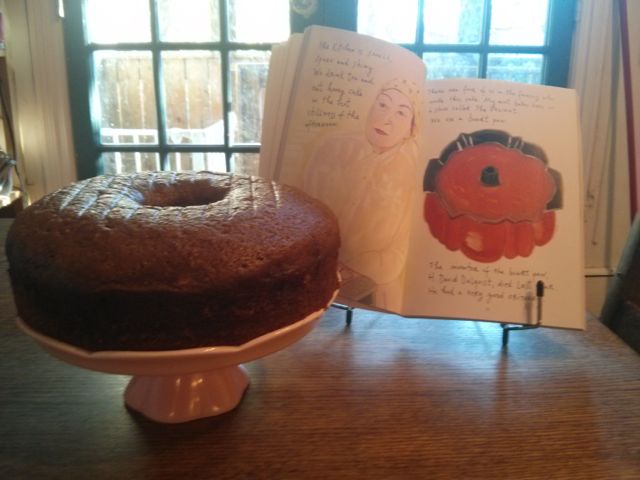May 10, 2015
Aching testicles, bodacious breasts, and other childhood lessons in anatomy

Image from here.
“My testicles are aching,” my daughter confessed to me the other day, which is the only problem I’ve so far encountered in my experience of having taught her the correct name for anatomical parts. That eventually, one might get mixed up when meaning to say “limbs” and start talking about her balls instead. And maybe this is the danger parents are hoping to avoid, those who pulled their children out of Ontario schools last week in protest of the new sex-ed curriculum. That there are so many body parts and the children aren’t ready, and with everything getting so mixed up, gender fluidity is surely just around the corner. It’s contagious. What else can you expect when it’s scrotums for everybody, and sexual identity is all a slippery slope.
I haven’t actually read the new sex-ed curriculum, because unlike some people, I’m not a total pervert. And I’ve got better things to do than vet school curricula for ways it’s going to warp my child’s mind, because the world is going to warp her anyway, and here is the point where my job as a parent kicks in: I send her into the world and then, when she gets home, together we try to make sense of the mixed messages it’s throwing at her. Like why, for example, in a hyper-sexualized world (ever driven down a highway and looked at a billboard lately?), we are so fearful of teaching our children there is such a thing as sex or that parts of their bodies actually have names.
I can’t do it all on my own though. As Hillary said, it takes a village. From proximity to my body, my daughter has learned about all varieties of skin rash, but that’s only the tip of the anatomical iceberg—there is so much more. And my plan for this education, which I hope will avert much future sextastrophe (the more you know!) involves extra-curricular activities.
My daughter is enrolled at swimming lessons at the university pool, and we strategically avoid the Family Change Room. After her lessons, we head to the Women’s where she has her hair washed surrounded by naked ladies. An invaluable education—how to be subtle, for one thing, and look like you’re not looking, and also how not to pee in the shower, which is mostly “at all”, but if you have to, don’t announce it while you’re doing it.
Mostly, her post-swimming showers are a lesson in the exquisiteness of womankind. Women of all shapes, sizes, and colours, gloriously naked, just having finished some activity that makes her body strong. Beautiful, all of them, stunning in their variety. Contrary to what a series of lingerie ads might have you suppose, there are so many ways to have a body. No two alike. Shockingly, almost all of them have pubic hair. And the bodies themselves are big and small, curved and slender, muscular, wiry, always amazing (because it’s ill-fitting clothing that fails to flatter the body, I find. The body itself requires no flattery at all). Bums, boobs, tummies and, yes, limbs. We’re both kind of mesmerized. What a sorority. You’re a woman, albeit a small one, and you’re part of this, a body-haver. It’s the most incredible way to put the whole thing in perspective.
Of course, it’s not all naked utopia. You’ve got the woman who’s squeezing her ass-zits in the shower, and the other who is shaving her thighs, which is kind of gross because her pubes are flowing across the tiles. But that bodies are disgusting is an important lesson too. And that they’ve got functions, beyond their ability to be stuffed into a bikini and be beholden to the male gaze. We’re getting all of this in the Woman’s Locker Room and I’ve got to shut up about this, or swimming lessons are going to up their fees. And even if they did, I’d probably pay the difference. There is awkwardness, yes, and the pain of aching testicles, but it’s the best basis for sex education that I can imagine—the knowledge our bodies are gorgeous and amazing—and knowing this we’re better prepared to handle whatever this curious world hands us next.
March 5, 2015
Perhaps the alphabetizing is a diversion
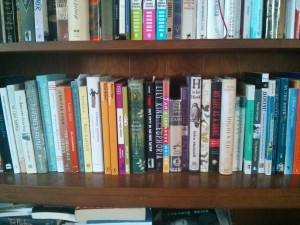 There is something. I am not sure what it is. Perhaps we’re that much closer to the sun and the days are longer, though winter is still very present, and maybe it’s that I’m keeping my head down and just trying to make it to the finish line. With March Break on the horizon (and we’re having a Dreaming of Summer party, inviting friends over so their moms can drink sangria in the morning with me), plus we’re spending much of April in England, which I’m so excited about. Before we leave, I am quite adamant that I shall finish the second draft of my novel, so that’s a preoccupation of late. I’ve been reading so many exceptional books (Eula Biss’ On Immunity at the moment), and reading fewer think-pieces. The other day, I culled my to-be-read shelf and got rid all the books I kind of always knew I was never going to read, and all the books that I was intending to read because I thought I should (and while I’ve meant to stop acquiring such books, I sometimes even fool myself). And then I alphabetized the books that were left, whereas before they’d been a series of teetering stacks. And it feels good, tidy, exciting. Though perhaps the alphabetizing is just a diversion. Is it possible that alphabetizing is always a diversion? I don’t think so though. It’s an order to chaos, something that makes sense. Regardless, it does feel like I’m walking along on the edge of something.
There is something. I am not sure what it is. Perhaps we’re that much closer to the sun and the days are longer, though winter is still very present, and maybe it’s that I’m keeping my head down and just trying to make it to the finish line. With March Break on the horizon (and we’re having a Dreaming of Summer party, inviting friends over so their moms can drink sangria in the morning with me), plus we’re spending much of April in England, which I’m so excited about. Before we leave, I am quite adamant that I shall finish the second draft of my novel, so that’s a preoccupation of late. I’ve been reading so many exceptional books (Eula Biss’ On Immunity at the moment), and reading fewer think-pieces. The other day, I culled my to-be-read shelf and got rid all the books I kind of always knew I was never going to read, and all the books that I was intending to read because I thought I should (and while I’ve meant to stop acquiring such books, I sometimes even fool myself). And then I alphabetized the books that were left, whereas before they’d been a series of teetering stacks. And it feels good, tidy, exciting. Though perhaps the alphabetizing is just a diversion. Is it possible that alphabetizing is always a diversion? I don’t think so though. It’s an order to chaos, something that makes sense. Regardless, it does feel like I’m walking along on the edge of something.
 What else? Heidi Reimer’s winning essay about female friendship has been published in Chatelaine. I interviewed Marilyn Churley about reuniting with her son and her fight to reform adoption disclosure in Ontario. My profile of Julie Morstad is now online at Quill and Quire. A few weeks back at 49thShelf.com, we did a virtual round-table on The State of the Canadian Short Story that was amazing. And finally, here is a photograph of my children, because I know there are a more than a few readers who visit this site for only that.
What else? Heidi Reimer’s winning essay about female friendship has been published in Chatelaine. I interviewed Marilyn Churley about reuniting with her son and her fight to reform adoption disclosure in Ontario. My profile of Julie Morstad is now online at Quill and Quire. A few weeks back at 49thShelf.com, we did a virtual round-table on The State of the Canadian Short Story that was amazing. And finally, here is a photograph of my children, because I know there are a more than a few readers who visit this site for only that.
January 26, 2015
Not Baklava
 This is not a post apologizing for a lack of updates. If you’ve ever learned anything about blogging from me, it’s probably that such posts are a waste of everybody’s time. What this post is, however, is an apology for my inability to blog while knitting. I can read while knitting; I can do this like a champion. I hold the book open with my feet, or employ my bookstand, and I basically knit this entire balaclava this way, while reading The Inconvenient Indian (and probably looked a bit curious and occupied as I did this during the hour I was waiting for Harriet to finish her dance class on Saturday). I have my limits though: I cannot read while knitting AND drink my tea, which is terrible. And I have yet to figure out how to knit and blog, which is why I have a completed balaclava to show for my Sunday evening instead of a freshly minted blog post. Alas, I think I made the right call, as it’s freezing this morning, and full facial covering goes a long long way.
This is not a post apologizing for a lack of updates. If you’ve ever learned anything about blogging from me, it’s probably that such posts are a waste of everybody’s time. What this post is, however, is an apology for my inability to blog while knitting. I can read while knitting; I can do this like a champion. I hold the book open with my feet, or employ my bookstand, and I basically knit this entire balaclava this way, while reading The Inconvenient Indian (and probably looked a bit curious and occupied as I did this during the hour I was waiting for Harriet to finish her dance class on Saturday). I have my limits though: I cannot read while knitting AND drink my tea, which is terrible. And I have yet to figure out how to knit and blog, which is why I have a completed balaclava to show for my Sunday evening instead of a freshly minted blog post. Alas, I think I made the right call, as it’s freezing this morning, and full facial covering goes a long long way.
It all went a bit wrong, however, once the balaclava was finished. It was 11:30 and everybody was asleep, but I was too excited to keep my success to myself. So I put the balaclava on myself and ran upstairs to wake up Stuart and show him. And I didn’t realize until I’d shaken him awake that it might be unnerving to be pulled from sleep in a darkened room by someone wearing a balaclava… The look of terror in his eyes was like nothing I’ve ever seen before. This morning I tried to reason with him: You knew your spouse was downstairs nearly finished knitting a balaclava. Surely it would be a crazy coincidence if the balaclava-wearer before you was somebody different?
But he insisted such rationales were beyond his mental capacity at that time. He is still a wee bit traumatized.
December 18, 2014
Unlikely Christmas: Graham Greene’s The Little Steamroller
I don’t know that I’ve ever come across a more unlikely Christmas tale than Graham Greene’s The Little Steamroller, his fourth and final picture book.
Harriet was a big fan of The Little Horse Bus awhile back, and she liked The Little Train too, but it’s true that The Little Steamroller is perhaps the least inspired of the lot. It’s worth reading for its absolute strangeness though, for being a distilled version of a Graham Greene novel. The Little Steamroller works clearing the snow at London Airport, and ends up foiling a diamond smuggling plot by The Black Hand Gang, a nefarious pack of smugglers operating out of Africa. All this takes place over Christmas, which the Steamroller is looking forward to, because he gets very few holidays (one of which is the August Bank Holiday, and it always rained on August Bank Holiday) and because Bill Driver will wrap up his nuggets of coal in Christmas paper.
 Greene’s picture books were originally published in the 1940s and 1950s, illustrated by his mistress Dorothy Glover (the projects were intended to provide her with an income, which I think makes these books delightfully unwholesome in origin; Glover would later end it with him when she discovered there was a third woman in the mix). Our copy is one of the 1970s’ reissues, with illustrations by Edward Ardizzone, but even with this “update”, the book has a decidedly vintage feel. I don’t suppose it helps any that our copy was purchased at a yard sale, and appears to have been stored for a time in a flooded basement.
Greene’s picture books were originally published in the 1940s and 1950s, illustrated by his mistress Dorothy Glover (the projects were intended to provide her with an income, which I think makes these books delightfully unwholesome in origin; Glover would later end it with him when she discovered there was a third woman in the mix). Our copy is one of the 1970s’ reissues, with illustrations by Edward Ardizzone, but even with this “update”, the book has a decidedly vintage feel. I don’t suppose it helps any that our copy was purchased at a yard sale, and appears to have been stored for a time in a flooded basement.
Learn more about The Little Steamroller and other Graham Greene picture books at Ariel S. Winter’s blog, “We Too Were Children, Mr Barrie,” where an important question is raised but left unanswered: why ever was a steamroller being used to clear snow anyway?
November 2, 2014
On Uncertainty, Mistakes, and Accidental Cake
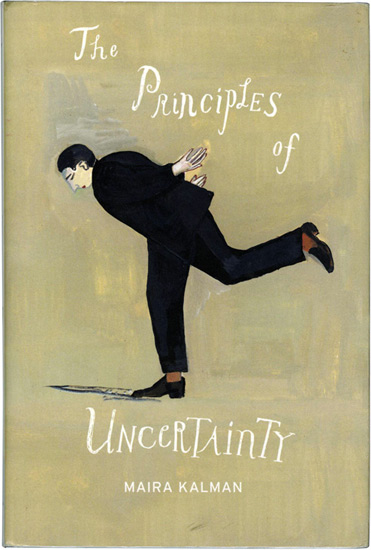 Tomorrow night in my blogging course, we will be discussing Rebecca Solnit’s essay, “Woolf’s Darkness: Embracing the Inexplicable”, which really might be one of my favourite pieces of writing ever, and whose wisdom is remarkably applicable to blogging, as well as to life itself. “To me, the grounds for hope are simply that we don’t know what will happen next, and that the unlikely and the unimaginable transpire quite regularly.”
Tomorrow night in my blogging course, we will be discussing Rebecca Solnit’s essay, “Woolf’s Darkness: Embracing the Inexplicable”, which really might be one of my favourite pieces of writing ever, and whose wisdom is remarkably applicable to blogging, as well as to life itself. “To me, the grounds for hope are simply that we don’t know what will happen next, and that the unlikely and the unimaginable transpire quite regularly.”
So I’ve been rereading the essay, following its twists and turns (and thinking about how much the public streets walked by Woolf’s narrator in “Street Haunting” can stand in for the blogosphere, “a form of society that doesn’t enforce identity but liberates it, the society of strangers, the republic of the streets, the experience of being anonymous and free that big cities invented”).
And then there was an excursion to Kensington Market to purchase not a pencil, but boots for the grown-ups in our family, because the shop there that caters to Portuguese construction workers is the best place we know to buy new Sorels. This was yesterday, and we’d woken up to flurries, so it seemed essential that we buy boots immediately. Plus while in the market, we’d get to pick up wood-smoked bagels and sausages from Sanagans for our evening meal. Once the boots were bought, Stuart with stroller was sent on the bagel errand, while Harriet and I took a quick diversion into Good Egg to scope out potential birthday presents for him.
Where I found this book, Maira Kalman’s The Principles of Uncertainty, based on her illustrated New York Times column. I’d never read the column, but I had been reading Solnit’s essay, which references Kalman’s work, her art, this book. And here was the book in my hands, so I had to have it. I came out of the shop with a stack of books, but pleased with myself. “Only one of these is for me.”
When I got home and went through the Solnit essay again, however, I found that I’d been mistaken. While a section of “Woolf’s Darkness” indeed shares a title with Kalman’s book, Solnit doesn’t mention Kalman at all. I’d made the whole thing up. I’d bought the book by accident. Which was kind of interesting to me, because I am so interested in the connections between books, how they speak to one another, and now I’m fascinated too by the idea of the mistaken allusion, the connection that was never there at all. But now it is, because I supposed it was. Our reading lives are such a tangled web.
All was not lost though. While Kalman’s book was far from Solnit’s essay (though for me, the two shall be linked forevermore—and they’re actually interesting companions), the book was wonderful. It was as though my mistaken allusion had been a trick to get The Principles of Uncertainty into my hands, where it had belonged all the while.
Full of gorgeous images, funny stories, curious questions, and delightful things. It has an index, as all the best books do, and an appendix with images of postcard collections (one of postcards with waterfalls), collected food packets, a list of all the characters in The Idiot by Dostoevsky, and the family recipe for the honey cake referenced on page 54:
“The kitchen is small, spare and shiny. We drink tea an eat honey cake in the hot stillness of the afternoon.”
This afternoon, I baked that cake with Harriet, because today had an extra hour within and there was space for such a thing. We had to borrow a bundt pan from our neighbour, Sarit, because we don’t have a bundt pan even though I thought we did. It seems there is no limit to what I’m capable of remembering wrong.
We had a good time baking—it is much less frustrating baking with Harriet now than when she was three and compelled to stick her hands in the batter (and she sneezes in the bowl hardly ever now). I explained to her that we were making a cake from the book that I had bought by mistake, and it’s that a wonderful thing about the universe—that an accidental book can lead to cake in the oven on a sunny afternoon:
“And then the all-clear sounded and people returned, hope undiminished. They returned, so elegant and purposeful to the books. / What does this have to do with bobby pins and radiators and kokoshniks? One thing leads to another.”
Then when we were all done, I proceeded to TWICE pick up the bundt pan (which was constructed of two parts) incorrectly, separating the bottom from the sides and batter seeping out onto the table. (“I heard at least two ‘fucks,'” Stuart inquired after. “What went wrong?”) As I spatula’d up the mess, Harriet patiently parroted what I’d been saying to her about the accidental book as we’d baked, that sometimes mistakes lead us in the most interesting directions.
“I don’t know if it’s quite the same with baking,” I confessed, sorry that everything was not so poetic, but perhaps it is, or it’s just that this cake is forgiving, because it was, and the cake was wonderful. Delicious, moist, and a perfect balance of spice and sweet. One thing leading to another indeed, and what good fortune when the thing one’s being led to is cake.
October 26, 2014
Would-Be Pickler Tries Nathan’s Famous
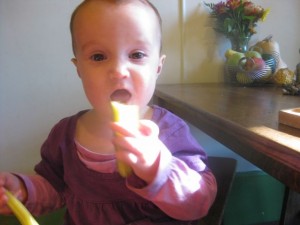 In my blogging course last Monday, we were talking about blog titles, and I conceded that there was probably an expert out there who—for SEO purposes and issues of general confusion—would advise you not to call your book blog Pickle Me This. But the problem with expert advice (and why expert advice so often doesn’t work for blogs, which are characterized by their refusal to conform to expectations) is that such advice cannot take into account the forces of serendipity.
In my blogging course last Monday, we were talking about blog titles, and I conceded that there was probably an expert out there who—for SEO purposes and issues of general confusion—would advise you not to call your book blog Pickle Me This. But the problem with expert advice (and why expert advice so often doesn’t work for blogs, which are characterized by their refusal to conform to expectations) is that such advice cannot take into account the forces of serendipity.
For example: You christen your blog “Pickle Me This” for no good reason in 2004, thereby enabling a delivery of actual pickles to land on your doorstep a decade later.
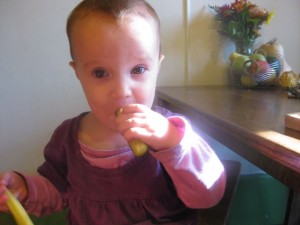 Except that there was a reason I named my blog Pickle Me This. Not a good one, but still.
Except that there was a reason I named my blog Pickle Me This. Not a good one, but still.
In 2004, I lived in Japan teaching English conversation to students with whom I usually had very little in common. This lack of commonality made our English conversation challenging. “What is your hobby?” became a conversation touchstone when all else had failed, mostly because the Japanese school system mandated that every student have a hobby. (Those students who were bad at everything usually ended up on sports teams charged with carrying equipment.) Bored housewives were also hobby connoisseurs, with interests including tea ceremonies, ikebana, and calligraphy, though more often than not, their answer to the hobbies question was “learning English,” which brought us full (albeit very small) circle, and made the minutes on our classroom clock tick by oh-so slowly.
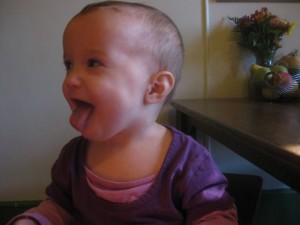 Living in Japan does something to the brain. To this day, all my favourite music is basically assembled from karaoke playlists, I was photographing my lunch before it was cool, and I’m still inclined to squeal, “Kawaii!” when the situation warrants it. Part of becoming “Japanified” was responding the experience of living abroad and discovering how wide the world was, all the while we were cut off from the culture around us by being foreigners. We forgot how to form proper sentences, how to behave, and partook in strange pursuits to the fill the gaps that had appeared in our lives now that they were being conducted so far from home.
Living in Japan does something to the brain. To this day, all my favourite music is basically assembled from karaoke playlists, I was photographing my lunch before it was cool, and I’m still inclined to squeal, “Kawaii!” when the situation warrants it. Part of becoming “Japanified” was responding the experience of living abroad and discovering how wide the world was, all the while we were cut off from the culture around us by being foreigners. We forgot how to form proper sentences, how to behave, and partook in strange pursuits to the fill the gaps that had appeared in our lives now that they were being conducted so far from home.
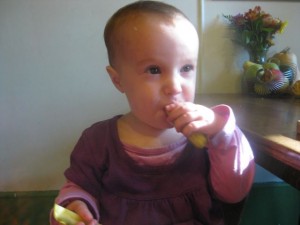 In 2004, I decided that I would learn how to pickle. This would be the beginning of something huge, I imagined. In Japan, anything was possible. I was picturing a sizeable cottage industry, adorable labels. They would say, “Pickle Me This,” the name of my company. One of my students—an avid pickler—wanted to support my ambitions and went as far as to give me a gift of pickling spice she’d made herself. “I want you to be a pickle success!” she told me.
In 2004, I decided that I would learn how to pickle. This would be the beginning of something huge, I imagined. In Japan, anything was possible. I was picturing a sizeable cottage industry, adorable labels. They would say, “Pickle Me This,” the name of my company. One of my students—an avid pickler—wanted to support my ambitions and went as far as to give me a gift of pickling spice she’d made herself. “I want you to be a pickle success!” she told me.
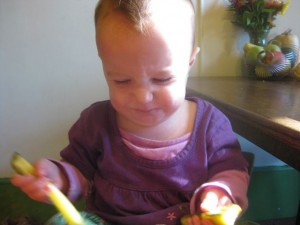 Except that I was a pickling disaster. Granted, a lot was working against me. My entire kitchen was a hot plate, and I didn’t own a measuring cup. I was illiterate, so could not read food labels to know what kind of vinegar I was employing for my pickling task (if it was vinegar at all). I had no culinary skills then, and struggled with following simple recipes, whose advice, I decided, was usually just a helpful suggestion, as I slung a fistful of something or other into my pot. In Japan, we ate spaghetti sauce that came out of pouches, and I thought that was just fine. So the precision involved in pickling was well beyond my ken.
Except that I was a pickling disaster. Granted, a lot was working against me. My entire kitchen was a hot plate, and I didn’t own a measuring cup. I was illiterate, so could not read food labels to know what kind of vinegar I was employing for my pickling task (if it was vinegar at all). I had no culinary skills then, and struggled with following simple recipes, whose advice, I decided, was usually just a helpful suggestion, as I slung a fistful of something or other into my pot. In Japan, we ate spaghetti sauce that came out of pouches, and I thought that was just fine. So the precision involved in pickling was well beyond my ken.
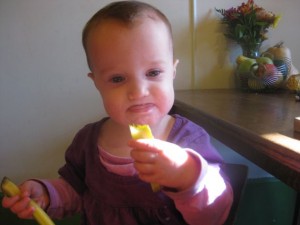 You can actually track the trajectory of my very short pickling career, which began with a blog post called “Are Pickles Supposed to Float?” and proceeded on to a post called “Dubious Pickles” the very next day, reporting that the pickles were shrivelling up in their jar. I don’t remember what happened to the pickles after that, but it is quite possible that I insisted on eating them even though they were vile and probably laced with botulism. I have a hard time admitting when my plans have gone wrong. I am a specialist in Stubborn as You Like. But I never made pickles again.
You can actually track the trajectory of my very short pickling career, which began with a blog post called “Are Pickles Supposed to Float?” and proceeded on to a post called “Dubious Pickles” the very next day, reporting that the pickles were shrivelling up in their jar. I don’t remember what happened to the pickles after that, but it is quite possible that I insisted on eating them even though they were vile and probably laced with botulism. I have a hard time admitting when my plans have gone wrong. I am a specialist in Stubborn as You Like. But I never made pickles again.
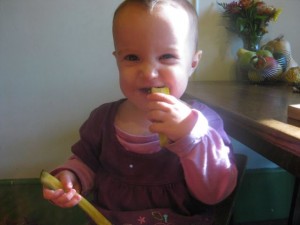 I’ve called myself a “would-be pickler” in the years since, usually in the bio on the blog that was christened Pickle Me This not long after my failed venture. This blog as been much more successful than the pickles, proving that you can’t win ’em all, but also that just because you lose some doesn’t mean it’s all lost. I was always going to be a better blogger than a pickler anyway. Accepting being so far from perfect is probably one reason I’ve been able to do so well as a blogger too, the pickles were certainly a fundamental lesson in that respect.
I’ve called myself a “would-be pickler” in the years since, usually in the bio on the blog that was christened Pickle Me This not long after my failed venture. This blog as been much more successful than the pickles, proving that you can’t win ’em all, but also that just because you lose some doesn’t mean it’s all lost. I was always going to be a better blogger than a pickler anyway. Accepting being so far from perfect is probably one reason I’ve been able to do so well as a blogger too, the pickles were certainly a fundamental lesson in that respect.
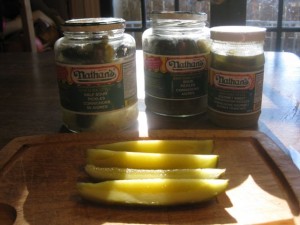 One consolation of failed pickledom is that it doesn’t keep one from eating pickles. Another consolation of failed pickledom is actual pickles on the doorstep from Nathan’s Famous, which are launching in Canada and are available in the refrigerated meat cooler sections at No Frills, Loblaws, and other grocery stores. Because a blog called Pickle Me This comes out on top when PR firms are searching for Canadian blogs about pickles. Perhaps this was part of my plan all along?
One consolation of failed pickledom is that it doesn’t keep one from eating pickles. Another consolation of failed pickledom is actual pickles on the doorstep from Nathan’s Famous, which are launching in Canada and are available in the refrigerated meat cooler sections at No Frills, Loblaws, and other grocery stores. Because a blog called Pickle Me This comes out on top when PR firms are searching for Canadian blogs about pickles. Perhaps this was part of my plan all along?
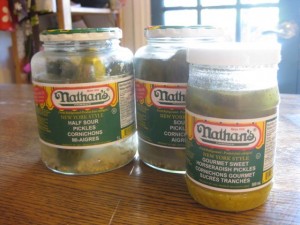 So we’ve been eating pickles all weekend, revelling in the bounty. I’m a bit crazy about the sweet horseradish pickles, though it’s possible I never met a sweet pickle I didn’t like. The sour and half sour are huge and full of crunch and flavour. Iris insists on eating them too, even though she makes the most ridiculous faces while doing so, but she keeps coming back for another bite, and so do I, because they’re good pickles.
So we’ve been eating pickles all weekend, revelling in the bounty. I’m a bit crazy about the sweet horseradish pickles, though it’s possible I never met a sweet pickle I didn’t like. The sour and half sour are huge and full of crunch and flavour. Iris insists on eating them too, even though she makes the most ridiculous faces while doing so, but she keeps coming back for another bite, and so do I, because they’re good pickles.
And maybe you have to have been responsible for bad pickles to do know how precious a good pickle really is.
(Thanks to the people at Foodfest America for making my pickle dreams come true.)
June 10, 2014
In which we encounter The Book Bike
The neatest thing I’ve come across lately is the Meatlocker Editions Book Bike, which was at the Bloor Street Festival on Sunday. It’s true that if you put up a red sign that says “Books”, I will be on of the many curious people who come flocking, and my curiosity was more than satiated by what I found. The Book Bike is a community library on wheels, a very mobile way celebrate books and reading. The Book Bike turns up at community events and flocking readers are invited to take a book or leave one (and they are interested in larger book donations too–just drop them a line).
In addition to pedalling books around the city, Meatlocker Editions are also in the business of inspiring readers and writers through various projects, including workshops and publications. Their focus is supporting young women writers, a most inspiring response to the under-represenation of women’s voices in literary spheres.
There were some very cool small press gems on display on the Book Bike. I was quite thrilled to get a copy of Desert of the Heart by Jane Rule, which Karen Hofmann recently included on her “Barefoot Girls and Wild Women” list.
All in all, a most spectacular encounter. Go MLE!
March 18, 2014
On Omens and the Dangers of Reading Too Much
 One of the most wonderful things I’ve read lately is “Odds and Omens: Superstition and IVF” by Terri Vlassopoulos, not least of all because it is an M Word kind of story, the kind of tale that gets told and makes so many women feel less alone. And even those of us who’ve not struggled with fertility can identify with what she’s writing about, because anybody who’s ever tried to get pregnant knows what tricks mind and body can play on one another during the two weeks or so before a pregnancy can be detected. I wonder sometimes if it’s a problem particular to those us who read too much, who imagine the world can be interpreted through signs and symbols just like a book.
One of the most wonderful things I’ve read lately is “Odds and Omens: Superstition and IVF” by Terri Vlassopoulos, not least of all because it is an M Word kind of story, the kind of tale that gets told and makes so many women feel less alone. And even those of us who’ve not struggled with fertility can identify with what she’s writing about, because anybody who’s ever tried to get pregnant knows what tricks mind and body can play on one another during the two weeks or so before a pregnancy can be detected. I wonder sometimes if it’s a problem particular to those us who read too much, who imagine the world can be interpreted through signs and symbols just like a book.
Terri’s essay also meant something to me, as I’ve been waiting for test results on my thyroid lump for the past two weeks. The good news, we learned this morning, is that the lump is still benign, which always comes as a relief. This is my third round of this, and I am definitely getting used to it. I didn’t really go insane with anxiety (though I am also not pregnant this time, and can drink!), and all the sleep I lost last night (which was plenty) is on account of my evil children. When I did it last August, I didn’t do too badly either, though the night before my results was this extraordinary evening so golden that I was quite sure I’d receive a fatal diagnosis in the morn, just for the sake of juxtaposition.
The morning of my biopsy appointment two weeks ago, in which I learned that my lump is ever-changing, I’d happened upon three accounts of women with terminal cancer diagnoses. That evening, with my biopsy much on my mind, I checked Facebook to inquire after an old friend of mine who has been living with metastatic breast cancer for the past three years, and discovered that she’d died the day before. Which was perspective, of course, a sign for me to suck it up because I’ve got it lucky in oh so many ways, but also pretty devastating and incredibly sad. Odds and omens indeed.
In some ways, I’m learning how to live with uncertainty. I no longer imagine “biopsy” to be a synonym for “death sentence”. I’ve had so many, and I just call them “tests” now. I have much cause to be optimistic that everything will be fine, and I very nearly am, and then. “What if it’s a trick? What if the universe is screwing with me, getting me all complacent so that when the bad news finally comes, I am so far from ready?” (Though who is ever ready? Sometimes I imagine that worrying is preparation of a kind, though I think I’m fooling myself.)
This is the point at which my husband reminds me that I am not the centre of the universe, that the world has not specifically arranged itself with my interests in mind. That if I’m in fact a character in a book, as I seem to think I am, it’s a book I haven’t finished reading yet, and that there’s no way really to ever know what comes next except to turn the page and see what happens.
January 14, 2014
On Seven Months Part 2: I Want My Hat Back
 Things started disappearing a few weeks after Iris was born.
Things started disappearing a few weeks after Iris was born.
First was our picnic blanket, which is a strange thing to lose. Last seen when the baby was two weeks old, the afternoon we ate cheese and bread on the grass by Robarts Library while the baby slept in the stroller. The outing had been an exercise in normalcy, and one at which we succeeded marvellously. But when it came time for Harriet’s play school picnic a week and a half later, our picnic blanket–actually an king-size sheet with a green leaf print that I’d bought at Walmart for a dollar back when I still bought things at Walmart–was nowhere to be found. We ate our lunch that day on a table cloth. “It will turn up,” was the thing we said, because we always say this and often it’s true. But our picnic blanket never did. We soon replaced it with a waterproof outdoor mat that we bought with a gift certificate our friends had given us when Iris was born. It was an upgrade. The loss of our picnic blanket was mysterious, but not a tragedy.
In November, we lost Iris’s snowsuit. Well, not a snowsuit exactly, but this blue fleece suit with a hood that was perfect for autumn, one that was worn and pilly because Harriet had worn it four years before. Iris had worn it to swimming lessons, but I’d carried her home without it under my coat because she was sleeping and I didn’t want to disturb her. She was warm enough. But we got home to find that the blue suit was nowhere, and though I enquired at the community centre’s Lost and Found a few times over the next week, it didn’t turn up there either. But then the season was changing, we had a real snowsuit waiting. The blue suit had been coming to the end of its life anyway.
You already know how in November, I also lost our passports. Mid-journey in Amsterdam airport, resulting in a missed flight, so much panic, plans for emergency visits to consulates in farflungdom. Passports did turn up, but only after airline staff had unpacked our baggage three times, and then finally we unpacked them once more under the instructions of the immigration police. Perhaps if we’d tried this technique with the first disappearance, we might have found the picnic blanket.
And then somehow I have lost my pink fleece sweater, one that is old and worn, so farewell, I suppose, but it is cold in my house, and moreover, the sweater wasn’t entirely frumpy. I thought maybe it had gotten mixed in with the three garbage bags of stuff we’d assembled to be donated to charity, but searches turned up nothing. This loss has left a sizeable hole in my already meagre wardrobe.
None of this makes any sense. I am meticulously organized. I have known to have fits of anxiety when Harriet’s puzzles are missing a piece and scour the house until we find it. For me, the definition of “laid-back” is when I put away her toy eggs without the full dozen in the plastic carton, and I always feel sort of proud of myself when this happens. I lost my quarter-teaspoon a few years ago, and this was such an odd occurrence that it stands out. I have been mis-measuring my salt ever since. It must have fallen down behind the cupboards.
This is why when the immigration police told me to unpack our bags just one more time, I protested. “Really,” I said. “They couldn’t be there. I never would have put them–” But there they were. How odd not to know one’s own mind, let alone one’s own bag. Since Iris arrived, it is as though the fabric of our daily life has been stretched so thin and enormous things keep falling through the fibres. The metaphor is simply too perfect, and sometimes I suspect I’ve walked into a short story plot. This kind of confusion is what happens when you read far more than you sleep.
On Sunday afternoon, I lost my hat. And then I kind of lost my mind, because I was just so tired of losing things. And it wasn’t like the blanket or the blue suit, things we could get along without, things with which I could follow my dictum that things are just things and not worth getting upset over. Because I love my hat. It is a red felted cloche with a fuchsia flower, a one-of-a-kind that I bought at a craft fair last winter. It cost $45, which is a lot for a hat, but it was a beautiful hat, and it covered my ears. I have a big head, so such hats are hard to come by.
I had been writing this blog post in my head for a few days before the hat actually got lost, and it had begun to seem really disturbing, like my life had taken on the blog post’s trajectory rather than the other way around.
With the loss of the hat, I had officially had enough. I am a fervent unbeliever in Mommy-Brain, which offends me first because it’s this self-perpetuated myth that motherhood makes us stupid, which does us no favours, and also because my brain has never been as sharp as its been since my girls were born, the world suddenly full of brilliant and surprising connections and I really do find the experience of being a mother absolutely inspiring like nothing else I’ve ever experienced. But yes, I am tired. And I keep losing things. I was imagining a place (beneath the floorboards, perhaps?) where all the missing things were gathered. It was the violation of the laws of physics that was my main concern with this troubling string of events, never mind Mommy Brain—how can an object simply disappear?
(We flirted with a hypothesis: Iris was the obvious suspect. Nothing had gone missing before she arrived in our household. What if Iris was a thief?)
Then we found my hat. I couldn’t believe it. The first time I retraced my steps, I’d come up with nothing, as with all the other missing things. It was all part of the same plot, and it was beginning to be infuriating, not to mention boring. But yes, the surprise twist. I present once again at another Lost and Found, and the attendant comes back with precisely what I am looking for held in his very hand. And suddenly it didn’t matter anymore that on the way to the Lost and Found, my purse strap had snapped in two and it was beginning to seem that my whole life was unravelling. Because it wasn’t. I had my hat back, and everything terrible seemed a little less inevitable after that.
We walked home and I didn’t even need my hat. The temperature was above zero, something spring-like in the air, and the sun was out. For the first time in a long time, we held hands without mittens, and our mittens were either tucked safely in our pockets or tied to our coat with string.
March 25, 2013
Harriet Street.
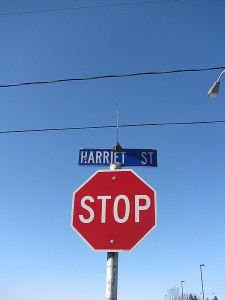 Many thanks to Matilda Magtree for sending me this wonderful photo. I will show it to Harriet tomorrow and she’ll be delighted because she is able to read every word found within it, and because it also includes her favourite word in the entire universe (which is Harriet, of course).
Many thanks to Matilda Magtree for sending me this wonderful photo. I will show it to Harriet tomorrow and she’ll be delighted because she is able to read every word found within it, and because it also includes her favourite word in the entire universe (which is Harriet, of course).

